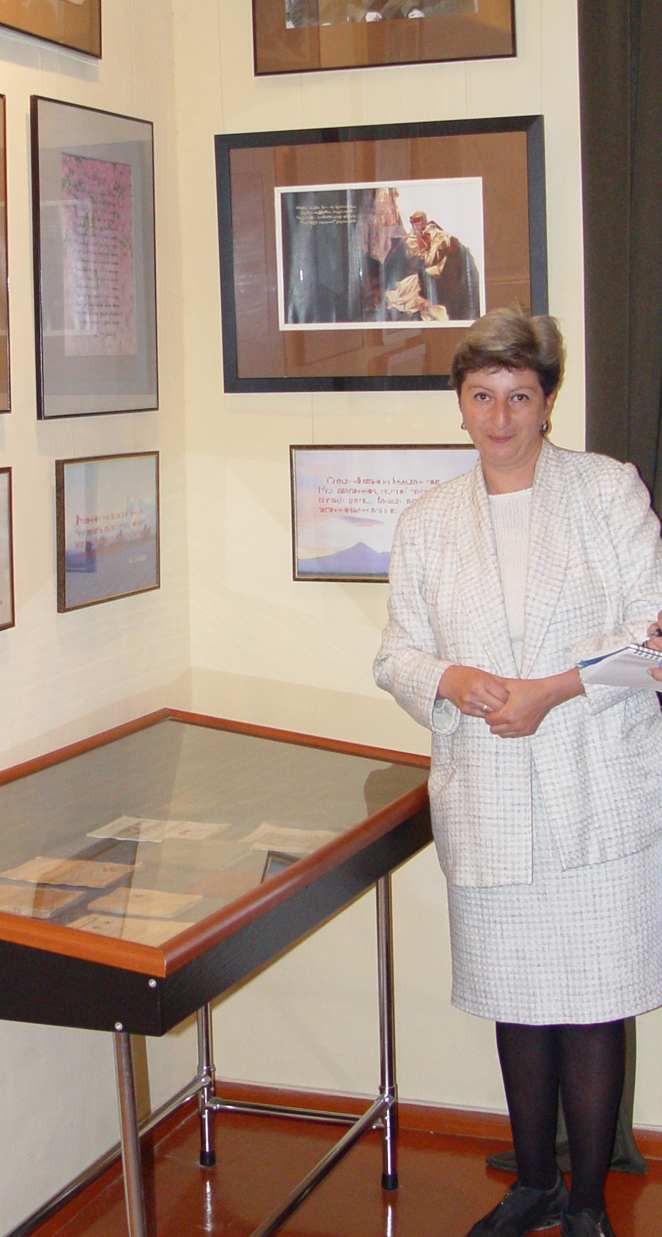
Narineh Khachadurian
(© K. Vrtanesyan)
Armenian News Network / Groong
December 5, 2006
Travel Wire
By Ruth Bedevian
GYUMRI, ARMENIA
`The alien world will give you no shack. But even if it gives a
palace under the sun, If you do not have a hut in your homeland,
You are still a forgotten orphan under a foreign moon.'
-- Hovhannes Shiraz

|
|
Great niece of H. Shiraz, Narineh Khachadurian (© K. Vrtanesyan) |
In May 2003 I was browsing through a commemorative publication of the Alex and Marie Manoogian Museum while waiting outside the office of His Holiness Karekin II in Etchmiadzin. I came across the quotation cited above and although I knew Shiraz to be a beloved 20th century poet, it was in that casual moment that his heart reached out and touched mine. Three and one half years later, I finally and eagerly made the journey to the Street of the Masters (Varbednerou Poghotz) in Gyumri to visit the Hovhannes Shiraz House Museum, and was privileged to be guided through the house by Narineh Khachadurian, the granddaughter of the poet's sister. Narineh is a musician by profession, but she has been asked to devote her time to the museum, which she does with great pleasure and pride.
Narineh greeted my friend Karen and me with an engaging smile and began to tell us that Shiraz was born in 1915 and was baptized in the Church of the Seven Wounds which is located in the city's central square. She quickly explained that his family name was Garabedian and in his early years was known to his family and friends as Onnig. She told us how he acquired the pen name Shiraz. When he began to write, he used various pen names and while working for a newspaper entitled Banvor (The Worker), he replaced contributors' articles with his own writings. (For such audacity, he was fired!) When the well known novelist, Adrbed, met him in the city park one day, he affirmed the young poet, declaring, `When I read your poetry, I feel the fragrance of roses, fresh and covered with dew, like the roses of Shiraz.' (Shiraz, one of Iran's oldest and largest cities, was famed for its abundant rose gardens and its revered poets, Saadi and Hafez, and has been known as the `City of Roses and Poets.') From that time on he adopted the pen name Shiraz.
Leading us into the first of the six rooms of the home, Narineh continued with details of her great uncle's childhood. His father, a farmer, was a native of Gyumri. His fields were close to the Turkish border and he was killed by the Turks in 1920. His mother, Astghik, was from Kars. She gave her children into the care of the American orphanage when the father died. There were three children - Gohar, (the oldest and Narineh's grandmother), Mariam and Hovhannes.
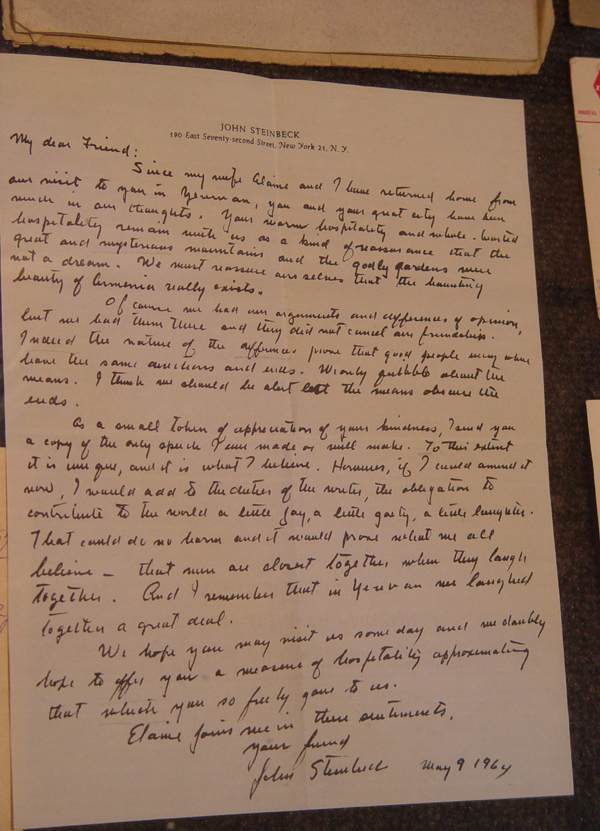
|
|
Letter to H. Shiraz from John Steinbeck (© K. Vrtanesyan) |
Narineh continued, `At age five he was already showing talent as a sculptor. This artistic talent has been handed down through the genes and his sons have become sculptors and artists. He was always running away from the orphanage. His last escape was at the age of seven.' She told us a touching story, `He tried to find his mother and was unsuccessful. Hungry and barefoot, he tried to steal bread from a woman. The woman instantly recognized her son. The two older girls were able to leave the orphanage and thus the family was reunited.' Astghik, doing laundry to eke out a living, asked for help from Father Ambakoom Der Kevorkian, and his wife (Yerestgkin Hripsime). Through their kindness the family lived in their basement. The couple also provided education for the young Onnig. Later in life Shiraz was to become famous for a work entitled, `A Monument to My Mother,' of which a stirring passage has been made into a mural in the museum. Loosely translated, it reads, `Do not forget your mother. If you do, find her and worship her.'
In the second room there was original furniture that belonged to Shiraz. His sisters bought the desk that he used all his life. `Shiraz was a great admirer of St. Gregory of Narek,' Narineh stated, `and he kept the `Book of Lamentations' (Narekatsi) always on his desk.' There it was displayed upon the desk along side his eyeglasses. Narineh leafed through the book, showing us the photos of his children that Shiraz had placed between the pages. The remaining four rooms contained exhibits of published works, memorabilia and photographs. Among all the memorabilia, a letter from American writer, John Steinbeck, who was awarded both a Pulitzer Prize for his `Grapes of Wrath' (1939) and a Nobel Prize for Literature in 1962, caught my attention. I immediately asked to photograph it which was generously allowed. It was dated May 9, 1964 in which Steinbeck thanked Shiraz for his hospitality when he visited him in Yerevan. Gifted men of intellect and passion possess mutual admiration, which is so evidenced in Steinbeck's sentiments. `...men are closest together when they laugh together. And I remember that in Yerevan we laughed together a great deal.' Literary scholars have noted a worship of the soil - a love for the land in Steinbeck's writing. It would appear that he and Shiraz were kindred spirits in that they revered their native soil.
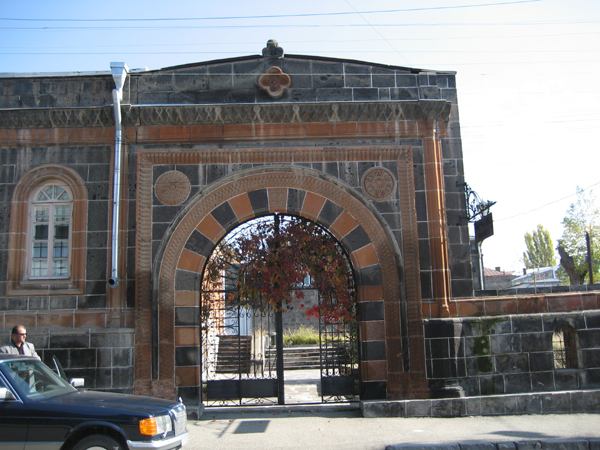
|
|
View of the Entrance to H. Shiraz Museum (© K. Vrtanesyan) |
Both men also were astutely critical of social conditions in their respective societies. Literary critics credit Shiraz with maintaining his independence from `party line' themes. It was his audacious patriotism in the face of soviet authority whereby he evoked Mount Ararat, Mesrob Mashtoz and other Armenian images that made him hugely popular.
Narineh covered events in his life for us. His very first published work in 1935 was `Beginning of Spring' which attracted attention.' In 1937 he entered the Armenian Literature Department of Yerevan's State University, from which he graduated in 1941. Shiraz married twice, the first time to Silva Gabudikyan (recently deceased), a poetess herself, and from her he had one son, Ara, before they were divorced. He married again to Shoushanig and fathered seven more children - three girls and four boys. Narineh stressed his fatherly qualities stating, `He was a devoted father and enjoyed playing with his children. He made Armenian History into bedtime stories for them.' She continued with obvious joy to tell us a story, `When his son was to take an examination, he declined, claiming that he was not ready. The teachers refused his request and he was obliged take the oral history examination. He passed with flying colors and was questioned as to how he knew so much. His answer was, `I have always known these things.''
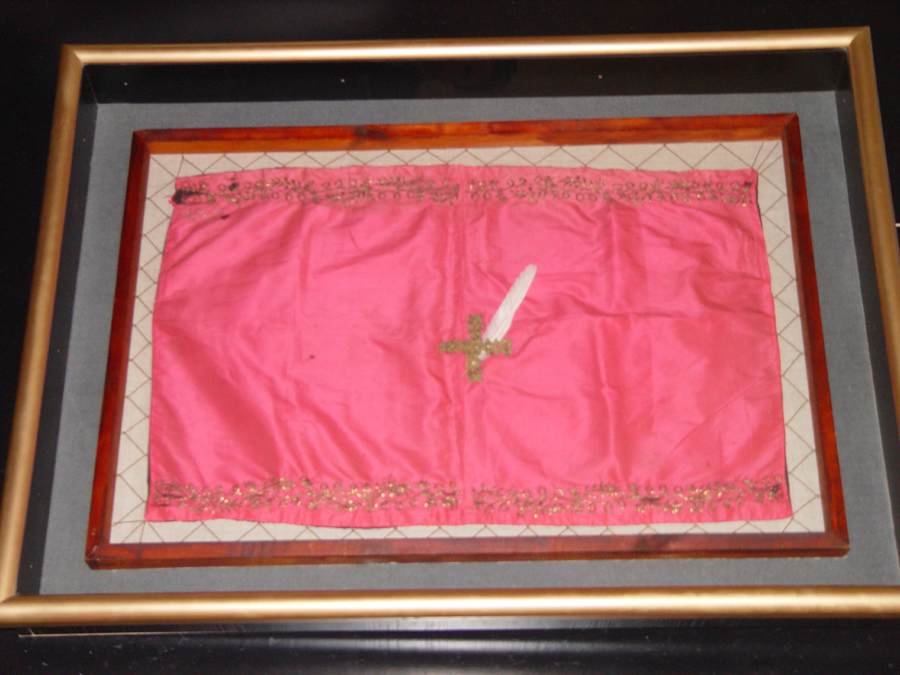
|
|
Gift from Parajanov (© K. Vrtanesyan) |
`1983 marked the opening of the Isahakian museum in Gyumri. By that time Shiraz had earned such wide popularity and respect that government officials, not wanting to wait until he was dead to honor him, wished to build him a home to live in and that would later be turned into a museum,' Narineh informed us. `He chose the present site because he wanted it to be near Isahakian's museum, saying, `When people come to visit Isahakian they will also visit me.' He did live to see its opening, but he never lived in the house, dying on March 14, 1984.' Indeed, the museums are a very short walk from each other on the same side of the street.
Narineh richly shared anecdotal information which delighted us. As a child, Onnig used to sell water on the street (a poem about which he wrote later). It was a common practice in early times. The water came from springs and people believed in its healthful properties. Sometimes people would pull his cap over his eyes, take the water and run off without paying him. Years later Shiraz entered the local church. An old man approached him and said, `I owe you.' Shiraz responded, `You owe me nothing.' `Ahh,' said the old man, `I owe you. When you were a boy I took water from you and didn't pay.' He gave Shiraz ten kopeks and Shiraz in turn gave the old man ten rubles - many more times valuable than the kopeks. This story might give one the impression that Shiraz became a rich man, but to the contrary, he lived a meager existence.
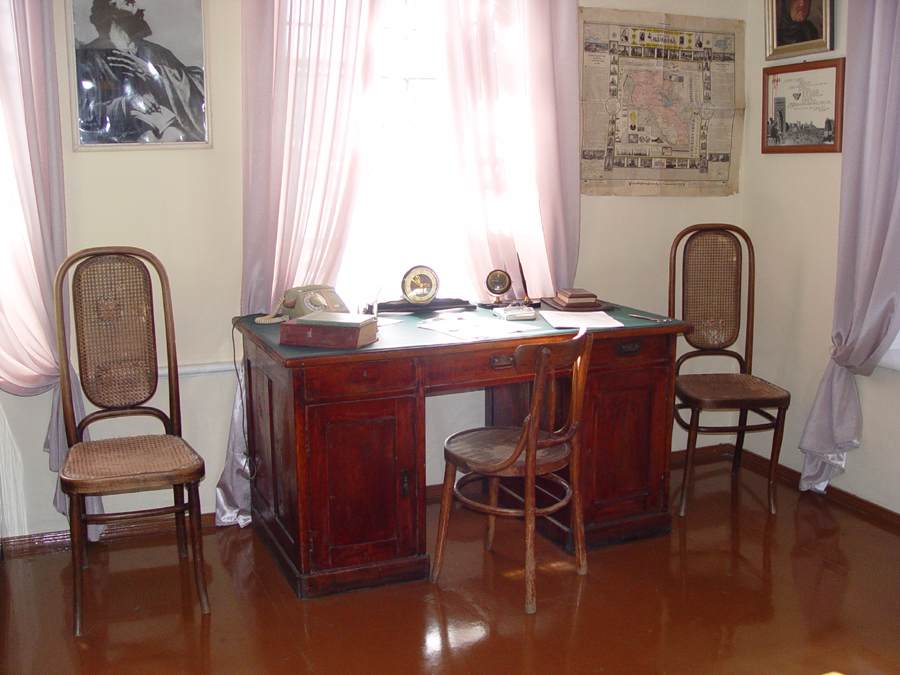
|
|
Shiraz' Desk (© K. Vrtanesyan) |
His works have been translated into sixty-seven languages. Shiraz donated the profits from one of his books of poetry entitled `Peace Be To All' to the orphans of the veterans of the USSR who fought in Vietnam. Shiraz published many books, almost all poetry, yet there are a few stories and translations among his works.
The last room we entered displayed the works of his children. Sipan, his son is a member of the Writers Union. His nephews are gifted sculptors. A gift of art from Sergei Parajanov to the family on the occasion of Shiraz' death was also on display.
Departing the museum I felt my stride a bit lighter, my spirit a bit lifted, knowing much more about Hovhannes Shiraz, a man whose love for his family and nation was reciprocal.
-- Ruth Bedevian continues her visits in Armenia. Many of her articles are at: http://www.groong.org/orig/armeniahousemuseums.html
|
Redistribution of Groong articles, such as this one, to any other
media, including but not limited to other mailing lists and Usenet
bulletin boards, is strictly prohibited without prior written
consent from Groong's Administrator. © Copyright 2006 Armenian News Network/Groong. All Rights Reserved. |
|---|